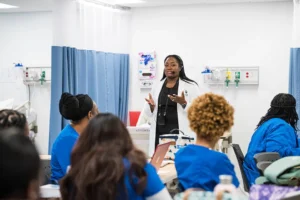Registered nursing is one of the most meaningful careers in society. You have a chance to make a positive impact on the lives of others, their families, and your community as a whole. In addition to the personal and professional rewards, RN jobs in the United States will continue to grow in the future. According to the U.S. Bureau of Labor Statistics, between 2022 and 2032, there is an expected 6% increase in jobs for registered nurses (Compared to 3% overall nationally). This will translate to an estimated 177,400 additional RN jobs!
If you have just graduated from high school, you may be considering nursing as your profession. In this piece, we’ll cover each of the major steps required to become a registered nurse, from choosing an education program to obtaining your official RN license. Let’s get started!
Choosing a Nursing Education Program
The first step to becoming a registered nurse is to choose the type of education program you’ll pursue. To become an RN, you’ll need to obtain either an Associate Degree in Nursing (ADN) or a Bachelor of Science in Nursing (BSN). These degrees can be obtained from a two-year ADN program or a BSN program that can take three to four years, depending upon the school. Let’s take a closer look at each option.
Associate Degree in Nursing (ADN)
An ADN degree is a 2-year degree that is the minimum education required to become a registered nurse. This is also the fastest option to complete a nursing degree. However, holding an ADN degree may limit your nursing career prospects. Many healthcare employers will prioritize hiring BSN graduates over ADN graduates as they have more training and clinical experience. While ADN programs focus heavily on hands-on skills, they often lack training in crucial areas such as leadership, critical thinking, and evidence-based decision-making. If you’re looking to become an RN as quickly as possible, an ADN could be a choice to consider – but it may limit your career advancement opportunities.
Bachelor of Science Degree in Nursing (BSN)

Find An Accredited Nursing Program
It is important when looking at nursing education programs that you ensure they are accredited and have approval from the state board of nursing.
These accrediting bodies ensure that a nursing school’s education and clinical training meet certain quality standards. When you attend an accredited school, you can be confident the education you’re receiving is truly preparing you for the nursing field. Accreditation is also something that healthcare employers often look for when hiring new nurses. It helps employers ensure that a potential nursing hire has the necessary knowledge and skills to be successful.
The two most common accreditation bodies for nursing programs are the Commission on Collegiate Nursing Education (CCNE) and The American Association of Colleges of Nursing (AACN). You’ll also want to check that a school is approved by the board of nursing in whatever state you wish to work as an RN. Check the state’s board of nursing website for that information.
Obtain Nursing Skills and Knowledge
Once you select a nursing education program and are admitted, you will start acquiring nursing skills. This will be accomplished through a combination of classroom training, labs, and simulation learning. Classes could be completed online, in-person, or a combination of both, depending on the nursing program. You can expect traditional homework assignments, group projects, and more interactive assignments to help develop your clinical judgment skills.
Clinical judgment is the ability to make evidence-based decisions about how care is provided to patients. It’s one of the most important parts of nursing.
The individual classes you will take are a part of a bigger curriculum. The curriculum in your program ensures you learn about foundational and major nursing concepts. Some key concepts include critical thinking, human physiology, ethics and legal standards, foundations of nursing practice, evidence-based practice, leadership, and population-specific topics. Population-specific classes help you gain knowledge about different health populations, such as labor and delivery, pediatrics (infants and children), adult health, geriatrics (older adults), and mental health.
Another important nursing skill you will obtain is professionalism, which is crucial to your future success in the healthcare industry. You will learn and practice skills such as communication, collaboration, empathy, and effective listening. These skills will help you when interviewing for a job and interacting with patients and co-workers.
Gain Real-World Experience in Clinicals
After you complete your general education requirements and have started to master some basic nursing knowledge and skills, you will begin clinicals. Regardless of what type of nursing program you choose, clinicals will be required to graduate. Nursing clinicals will align with core nursing concepts to help you gain real-world experience and further develop your clinical judgment and hands-on skills.

Typical clinical rotations will give you experience with hospitals, long-term care, and community settings. You will work with different patient populations, including infants, children, adolescents, adults, and older adults. Specialty areas you will rotate through could be labor and delivery, mental health, acute care, emergency care, and even hospice and palliative care programs. The goal is to give you various experiences that increase your skills and help you decide on a focus area when starting your career.
Graduate From ADN or BSN Program
When thinking about how to become a registered nurse after high school, one of the most important steps is graduation. Graduating from an ADN or BSN program is an exciting step but does require consistent work. The graduation requirements will differ for each nursing program. But, for all programs, you will need to complete and pass required classes, successfully complete all clinical requirements.
Additionally, many nursing programs offer or require NCLEX-RN exam training. At Arizona College of Nursing for example, all students take an NCLEX-RN preparation course in which they’ll get personalized feedback to help them prepare for the exam.
Apply for Licensure & Pass NCLEX-RN Exam
After graduating, the next step is to apply for your RN licensure and take the NCLEX-RN exam. The order in which you apply for licensure varies depending on the state. In most cases, you can begin the licensure application process before taking the NCLEX-RN exam.
NCLEX-RN Exam
The NCLEX-RN exam is the official test that all nursing students must pass in order to become an RN. NCLEX stands for National Council Licensure Examination and is regulated by the National Council of State Boards of Nursing (NCSBN). The NCLEX exam is highly regulated and ensures nurses nationwide are prepared for nursing practice.
Recent changes in 2023 changed the formatting and type of questions asked during the exam. The new format, Next Generation NCLEX, strongly focuses on assessing clinical judgment and nursing graduates’ ability to make evidence-based decisions in real-world scenarios. The exam is taken on a computer and will involve various question types, including clinical judgement case studies.
The different question types are designed to make the exam more interactive and better assess your knowledge. The exam is a simple pass / fail format.
Preparation for the NCLEX exam starts when you begin your nursing program. Each nursing school approaches practice exams differently. Depending on how much time lapses between graduation and your exam, you will also need to study and prepare independently. Many nursing schools like Arizona College of Nursing have dedicated NCLEX preparation programs to support your success.
RN Licensure
Licensure for registered nurses will vary between states. You will want to verify the necessary steps for licensure through the state board of nursing for the state in which you’d like to work as an RN. In general, you can begin the licensure process shortly after graduating from an accredited BSN or ADN program
As part of the application, you will complete a background check, including fingerprinting and disclosure of any criminal convictions. You will also need to provide official transcripts from your degree program. Some states require specific courses or continuing education units (CEUs) to be eligible for licensure.
After passing the background check, you’ll be approved to take the NCLEX-RN exam. Once you’ve passed the NCLEX-RN, you’ll receive your licensure and will officially be a registered nurse!
Start Your Future in Nursing Today

Why Choose Arizona College of Nursing?
- Earn a BSN degree in 3 years or less with eligible transfer credits
- Campus locations throughout the US
- Night classes for general education courses
- Hybrid Online/In-Person format for general education classes
- Nursing education is all we do
- CCNE-Accredited Program*
- NCLEX-RN success coaches and exam preparation class
- Financial aid available to those who qualify
Discover Your Path to a Career in Nursing
Information in this post is accurate as of .
*The Bachelor of Science in Nursing (BSN) degree program at Arizona College of Nursing is accredited by the Commission on Collegiate Nursing Education (https://www.aacnnursing.org/). All Arizona College of Nursing and Arizona College campuses are institutionally accredited by the Accrediting Bureau of Health Education Schools (https://www.abhes.org/), a U.S. Department of Education-recognized national accrediting agency.

